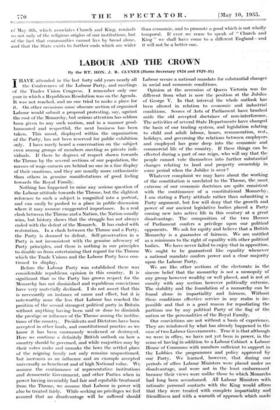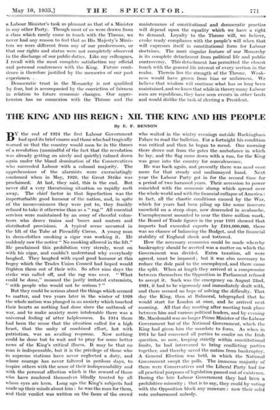LABOUR AND THE CROWN
By the RT. HON. J. R. CLYNES (Home Secretary 1924 and 1929-31)
IHAVE attended in the last forty odd years nearly all the Conferences of the Labour Party, and meetings of the Trades Union Congress. I remember only one year in which a Republican Resolution was on the Agenda. It was not reached, and no one tried to make a place for - it. On other occasions some obscure section of organized Labour would submit a proposal protesting, say, against the cost of the Monarchy, but serious attention has seldom been given to any such motion, and in a manner good- humoured and respectful, the next business has been. taken. This mood, displayed within the organization _ of the Party, has not been reserved fur public exhibition only. I have rarely heard a conversation on the subject even among groups of in. embers meeting as private indi- viduals. If there be degrees of respect shown towards . I the Throne by the several sections of our population, the masses of wage-earners are behind no one in a fine display of their emotions, and they are usually more enthusiastic , than others in genuine manifestations of good feeling towards the Royal Family. Nothing has happened to raise any serious question of the Labour attitude towards the Throne, but the slightest. reference to such a subject is magnified into a portent,. and can easily be pushed to a place in public discussion where it may assume exaggerated importance. In a real, clash between the Throne and a Nation, the Nation usually. wins, but history shows that the struggle has not always, ended with the defeat of the Mtmarch. It has ended with restoration. in a clash between the Throne and a party, the Party is doomed to defeat. Self-preservation in a Party is not inconsistent with the genuine advocacy of' Party principles,. and there is nothing in our principles to disable us from entertaining that regard for the Throne. which the Trade Unions and the Labour Party have con- tinued tinned to display.
Before the Labour Party was established there was, considerable republican opinion in this country. It is significant that as the Party has grown respect for the Monarchy has not diminished and republican convictions. have very materially declined. I do not assert that this ' is' necessarily an instance of cause and effect, but it is: noteworthy none the less that Labour has reached. the position of the second strongest political party in Britain without anything having been said or done to diminish the prestige or influence of the Throne among the institu-, tions of the country. Preildents and Dictators have been accepted in other lands, and constitutional practice as we know it has been enormously weakened Or destroyed. Here we continue a definitely British outlookon how a country should be governed, and while majorities may by their votes make and unmake the laws the settled place of the reigning family not only remains unquestioned; but increases as an influence and an example accepted universally as beneficent and of high National value. We. assume the continuance Of representative institution and democratic Government, and other Parties when in power having invariably had fair and equitable treatment from the Throne, we assume that Labour in power, also be treated fairly. While seeking no privileges we feel assured that no disadvantage will be suffered- ahead& Labour secure a national mandate for substantial changes in social and economic conditions.
Opinion at the accession of Queen Victoria was far. different from what is now the position at the Jubilee of George V. In that interval the whole outlook has - been altered in relation to economic and industrial conditions. Scores of Acts of Parliament have brushed aside the old accepted doctrines of non-interference.. The activities of several State Departments have changed.
the basis of our trading system, and legislation relating.
to child and adult labour, hours, .remuneration,. rest„ holidays, and governing the relations between _employers; and employed has gone deep into the economic and conunercial life of the Country. If these things can be, effected during a part of one reign, who will say that the, people cannot , vote themselves into further substantial changes relating to land and property ownership . some period when the Jubilee is over?
Whatever complaint we may have about the working of the constitution is unrelated to the Throne, the most extreme of our economic doctrines are quite consistent .
with the continuance of a constitutional Monarchy., I am stating a Party attitude. rather than submitting a . Party .argument, but few will deny that the growth and, power of our ancient legislative bodies placed a Party. coming new into active life in this century at a great. disadvantage. The composition of the two Houses, of Parliament confers .a privilege upon our political opponents. We ask for equity and believe that a British Monarchy is a guarantee of fairness. We are entitled as a minimum to the right of equality with other political. bodies. We have never failed to enjoy that in opposition. We ought to be guaranteed like equality . whenever, a national mandate confers power and a clear majority upon the Labour Party. .
We are like other sections of the electorate in. the sincere belief that the monarchy is not a monopoly of any group however wealthy or well placed, and is notat enmity with any . section., however politically extreme. The stability and the foundation of a monarchy can be found alone' in impartiality and fairness. Without these conditions effective service in any realm is possible and that is a good reason for repudiating the partisan use by any political Party of the flag of the nation or the personalities of the Royal Family. Our convictions are not Without a basis of experience. They are reinforced by what has already happened in the case of two Labour Governments. True it is that although we were in office., we not yet been in power; in the sense of having 'in addition to a Labour Cabinet a Labour . .
. . . . House of Commons with numbers sufficient to support in the Lobbies the programmes and policy approved '13y" our Party. We learned, however, that during . our periods of office Labour Ministers were placed under no disadvantage, and were not in the least embarrassed" beer ause their' views were unlike those to which Monarchs had long been accustomed. All Labour Ministers with intimate.. personal contact's- with the King would affirm that. they were treiiied With complete impartiality and friendliness and With a warmth of approach which made a Labour Minister's task as pleasant as that of a Minister in any other Party. Though most of us were drawn from a class which rarely came in touch with the Throne, we never had any reason to feel that as His Majesty's Minis- ters we were different from any of our predecessors, or that our rights and status were not completely observed in the discharge of our public duties., Like my colleagues, I recall with the most complete satisfaction -my official and personal conferences with the King. Future confi- dence is therefore justified by the Memories of our past experience, . . : . Democratic trust in the: Monarchy is not qualified by fear, but is accompanied by the, conviction of fairness in relation • to future economic changes. Our appre- hension . has no connexion with the Throne and the maintenance of constitutional and democratic practice will depend upon the equality which we have a right to demand. Loyalty to the Throne will, we believe, evoke ready compliance with the people's will when that will expresses itself in constitutional form for Labour doctrines. The most singular feature of our Monarchy is its. complete detachment from political life and public controversy.: This detachment has permitted the closest touch with the general life interest of every section in the realm. Therein lies the strength of the Throne. Weak- ness :would have grown from bias or unfairness. We believe that wisdom will continue what has so long been maintained, and we know that while in theory many Labour' men are republican, they have seen events in other lands. and would dislike the task of electing, a President.



































































 Previous page
Previous page